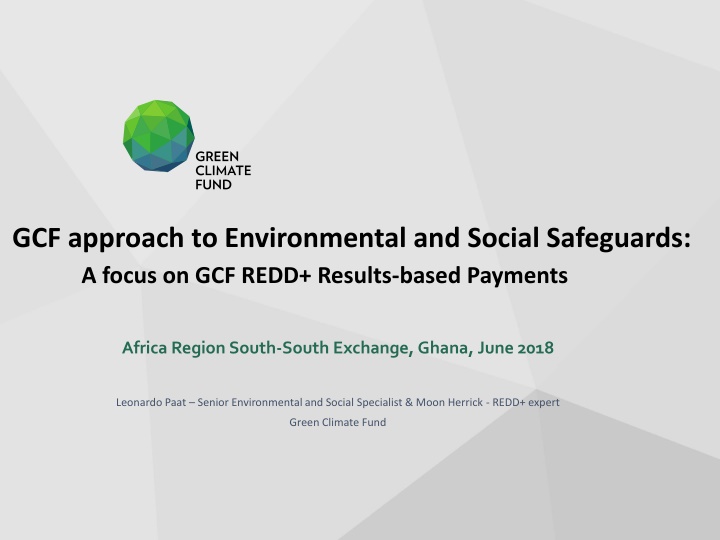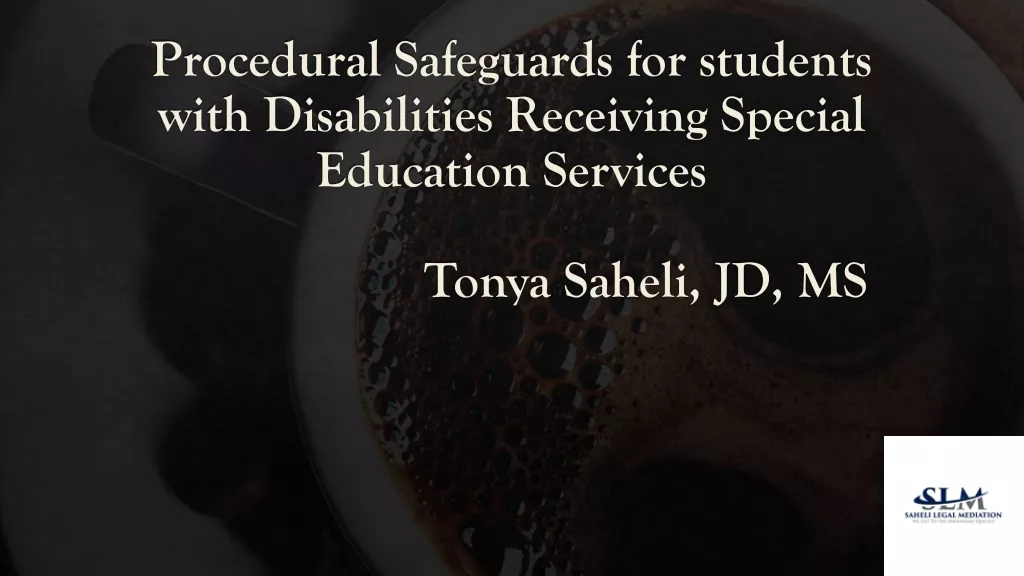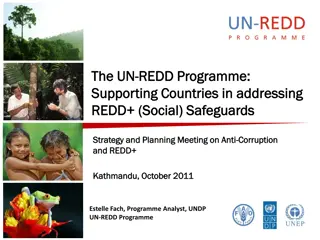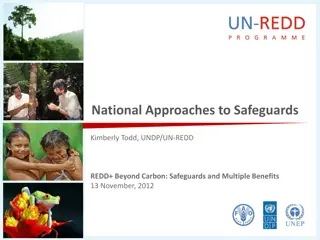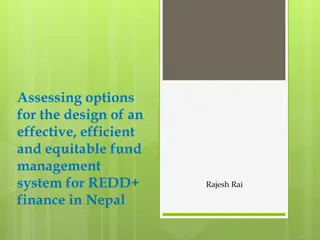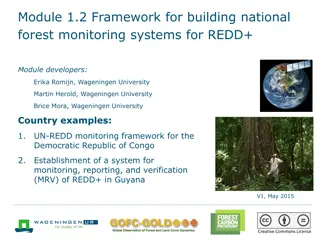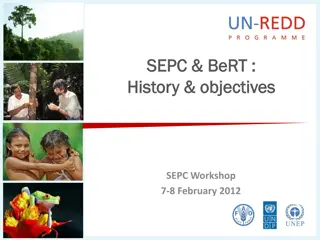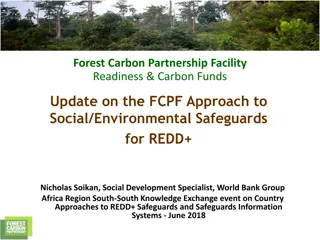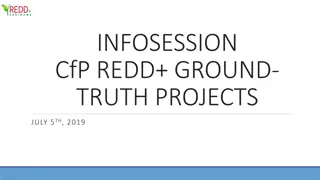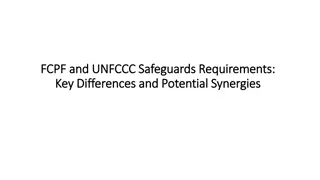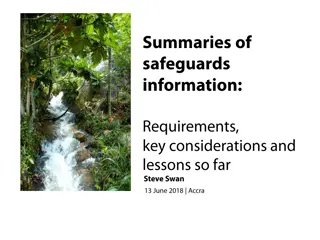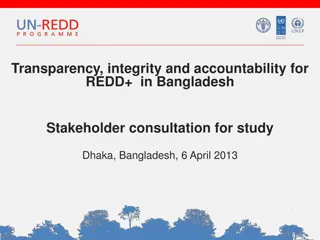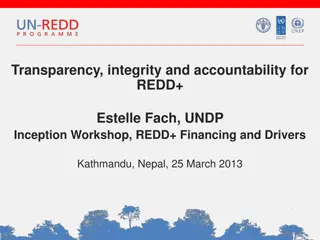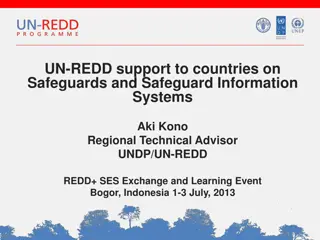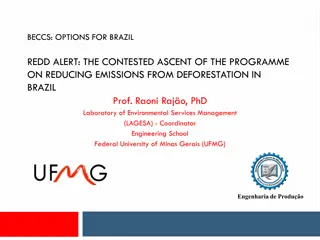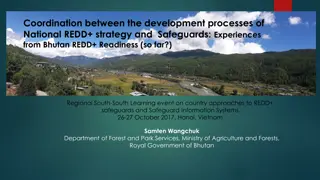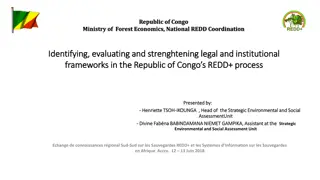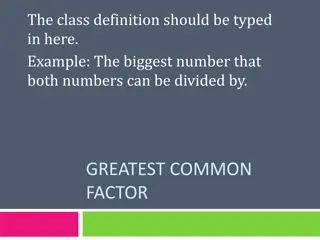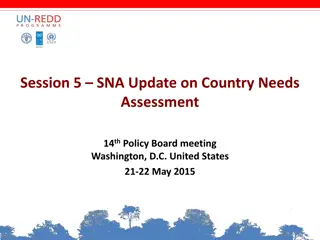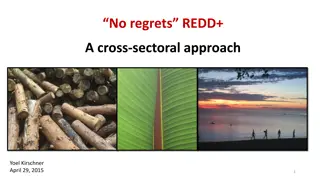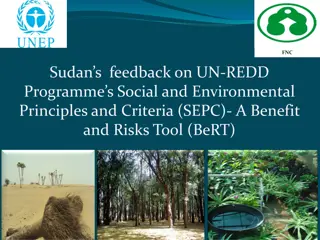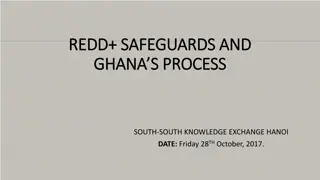GCF Approach to Environmental and Social Safeguards: A Focus on GCF REDD+ Results-based Payments in Africa
The content discusses the Green Climate Fund's approach to environmental and social safeguards, specifically focusing on the REDD+ results-based payments program in the Africa region. It covers standards, due diligence roles, risk-based approaches, ESS requirements for the REDD+ pilot program, past actions, future strategies, and the role of Accredited Entities in ensuring compliance with safeguards. The document emphasizes stakeholder engagement, disclosure of information, grievance redress, monitoring, and reporting, among other key aspects essential for sustainable project implementation.
Download Presentation

Please find below an Image/Link to download the presentation.
The content on the website is provided AS IS for your information and personal use only. It may not be sold, licensed, or shared on other websites without obtaining consent from the author.If you encounter any issues during the download, it is possible that the publisher has removed the file from their server.
You are allowed to download the files provided on this website for personal or commercial use, subject to the condition that they are used lawfully. All files are the property of their respective owners.
The content on the website is provided AS IS for your information and personal use only. It may not be sold, licensed, or shared on other websites without obtaining consent from the author.
E N D
Presentation Transcript
GCF approach to Environmental and Social Safeguards: A focus on GCF REDD+ Results-based Payments Africa Region South-South Exchange, Ghana, June 2018 Leonardo Paat Senior Environmental and Social Specialist & Moon Herrick - REDD+ expert Green Climate Fund
Content Part 1: Overview of GCF ESS ESS Standards and due-diligence roles Risk- based approach Part 2: ESS for GCF REDD+ RBP GCF REDD+ pilot programme Summary of Safeguards requirements for the pilot programme Safeguards for RBP: past and future Past actions: 2 standards Future Actions: Use of Proceeds Past and Future: Role of AEs
ESS standards and due diligence roles Accredited Entities due diligence and mitigation measures risk category stakeholder engagement disclosure of information grievance redress monitoring and reporting Countries Assessment and Management of ES Risks and Impacts consistency with country requiremen ts and ESS standards multi- stakeholder consultatio ns Labor and Working Conditions Resource Efficiency and Pollution Prevention Community Health, Safety & Security Biodiversity Conservation and Sustainable Management of Living Natural Resources Land Acquisition and Involuntary Resettlement GCF confirms consistency of due diligence confirms risk category stakeholder engagement, disclosure, grievance redress reviews performance reports Indigenous Peoples Cultural Heritage
Risk-based approach Comprehensive impacts assessments and management plans or frameworks, stakeholder engagement and grievance redress High risk A or I1 B or I2 C or I3 significant adverse impacts that are irreversible, diverse, or unprecedented Focused assessments and management plans or frameworks, stakeholder engagement and grievance redress Moderate risk potential impacts less adverse, limited, site- specific, likely reversible; mitigation measures readily designed and implemented Low risk Screening and management plan as may be needed, stakeholder engagement and grievance redress no to minimal adverse environmental and social impacts easily and fully mitigated through routine measures
OPEN FOR 5 years (2017 2022) ENVELOPE USD 500 million FINANCIAL VALUATION USD 5 /tCO2eq ELIGIBILITY PERIOD 31 Dec 2013 31 Dec 2018 Secondary forests threatened by deforestation e.g. Sustainable forest management for timber & non-timber forest products, PES ACCESS MODALITY Accredited Entities SUBMISSION Concept note & funding proposal ASSESSMENT Scorecard (including Cancun+ ESS)
Eligibility criteria safeguard information system in place summary of information Information disclosure summary of information, against Cancun, provided by countries env./soc. assessment, against GCF ESS, provided by Accredited Entities Assessment concept note scorecard (SIS in place and recent summary submitted) RBP proposal scorecard sections 2-5 (how RBAs comply with ESS) Use of proceeds RBPs reinvested in line with GCF goals and safeguards assessment process compliance with GCF policies; annual reporting required Grievance redress operational mechanism to receive and address complaints effectively ESA will include a description grievance redress mechanism(s) Non-carbon benefits evidence non-carbon benefits provided on a voluntary basis But information on non-carbon benefits scored during assessment
Safeguards for RBP: past and future Application of GCF policies and procedures to activities undertaken in the past: GCF Environmental and Social Safeguards Gender policy Interim policy on prohibited practices Application of GCF policies and procedures to the use of RBPs (in the future): GCF Environmental and Social Safeguards Gender policy Interim policy on prohibited practices Indigenous Peoples Policy Monitoring and Accountability Framework Other relevant GCF policies Interim Policy on Fees for Accredited Entities Accreditation
Past actions: 2 standards Cancun Safeguards: Apply to national level Open to national interpretation Applied by countries for all REDD+ activities GCF ESS: Apply to all GCF activities (all scales) Provide guidance for interpretation Applied by AEs in cooperation with countries Generally more detailed and comprehensive
Future Actions: Use of Proceeds Simpler application as follows the same logic as normal investments GCF policies to be followed: Gender Policy Indigenous People s policy Interim policy on Prohibited Practices Monitoring and Evaluation framework (simplified reporting) ESS: Due Diligence Risk Category Stakeholder Engagement Grievance Redress
Past and Future: Role of AEs AEs will: Agree to Funded Activity Agreement with GCF Provide: Due Diligence Reports on how the ESS were complied with in the process of creating the ERs Evidence of stakeholder engagement Information about grievance redress mechanism(s) and outcomes
